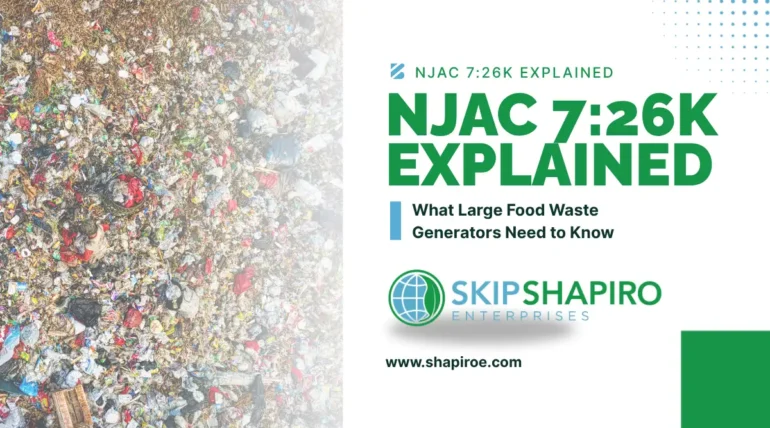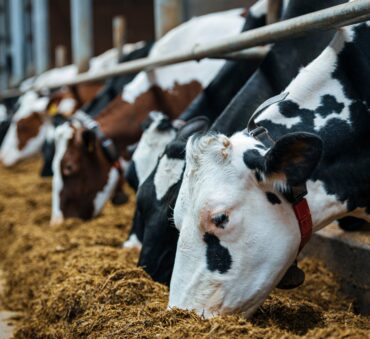Large food waste generators are huge contributors to landfill use, greenhouse gas emissions, and environmental degradation.
To reduce environmental impact, new regulations are required to limit their landfill disposal—and New Jersey food laws are a great example of how legislation can drive sustainable waste management practices.
States interested in adopting stricter laws should take a closer look at NJAC 7:26K, the NJ food waste law that’s set to reduce annual food waste generation and position New Jersey as a leader in sustainability.
This guide sets out to do two things: provide direction for new policies and help New Jersey companies determine whether the law applies to them, how they can stay compliant, and how food waste recycling companies like Shapiro can support them in navigating these new rules.
Key Takeaways
- NJAC 7:26K requires large generators of food waste to source-separate their food scraps and ensure they are recycled or reused rather than sent to landfills.
- A large food waste generator is any establishment that produces an average of 52 or more tons of food waste per year, including commercial food wholesalers, distributors, industrial processors, and similar operations in New Jersey.
- Large food waste generators located more than 25 road miles from an authorized food waste recycling facility are exempt from this law. The exemption also applies to companies that are within 25 miles of a facility if that facility lacks capacity or is unable to accept the generator’s food waste.
- Violations are subject to a civil penalty of $250 for the first offense, $500 for the second, and $1,000 for the third and each subsequent offense.
What is NJAC 7:26K?
NJAC 7:26K refers to New Jersey’s regulations that enforce the state’s Food Waste Recycling Law (P.L. 2020, c.24). This New Jersey food waste law was signed on April 14, 2020, by Governor Murphy and became effective on October 14, 2021, requiring large generators of food waste to source-separate their food scraps and ensure they are recycled or reused rather than sent to landfills.
NJAC 7:26K supports New Jersey’s goal of reducing its annual food waste generation to 50% of 2017 levels by 2030. According to the NJDEP Food Waste Reduction Plan, “With approximately 1.48 million tons of food waste that was generated in New Jersey in 2017, to achieve the 50×30 goal by the year 2030, the state must reduce the amount of food waste generated by 57,079 tons per year, the equivalent of over 2,200 loaded garbage trucks, of food waste per year to reach 742,038 tons by 2030.”
New Jersey is among a growing number of states with mandatory food waste recycling for large waste producers, reflecting a broader national trend toward reducing greenhouse gas emissions, conserving resources, and promoting a circular economy.
Who Counts as a “Large Food Waste Generator”?
Many companies are unsure if New Jersey food waste laws apply to them. This leads us to the ever-important question: Who is considered a large food waste generator?
A large food waste generator is an establishment that generates an average projected weight of 52 or more tons of food waste per year. That said, if your company produces around 1 ton of food waste a week, then this law likely applies to you.
However, it’s important to note that the one-ton-per-week figure is an average. Food waste generation can fluctuate throughout the year, so compliance is based on total annual waste rather than weekly output.
The following establishments or locations may be subject to this law:
- Commercial food wholesalers
- Distributors
- Industrial food processors
- Supermarkets
- Resorts
- Conference centers
- Banquet halls
- Restaurants
- Educational or religious institutions
- Military installations
- Prisons
- Hospitals
- Medical facilities
- Casinos
Every company should evaluate its annual food waste generation to determine whether it falls under the state’s food waste regulations. If you’re unsure, you can perform a food waste audit to identify waste sources and quantities.
And if your company produces less than 52 tons of waste a year, that doesn’t mean you can’t improve your recycling efforts. By enhancing food waste management in New Jersey, you can play a part in achieving the state’s goal to reduce food waste by 50%.
Key Requirements of NJAC 7:26K for Large Generators
Companies must be aware of the requirements of NJAC 7:26K in order to choose the best food waste solution in NJ.
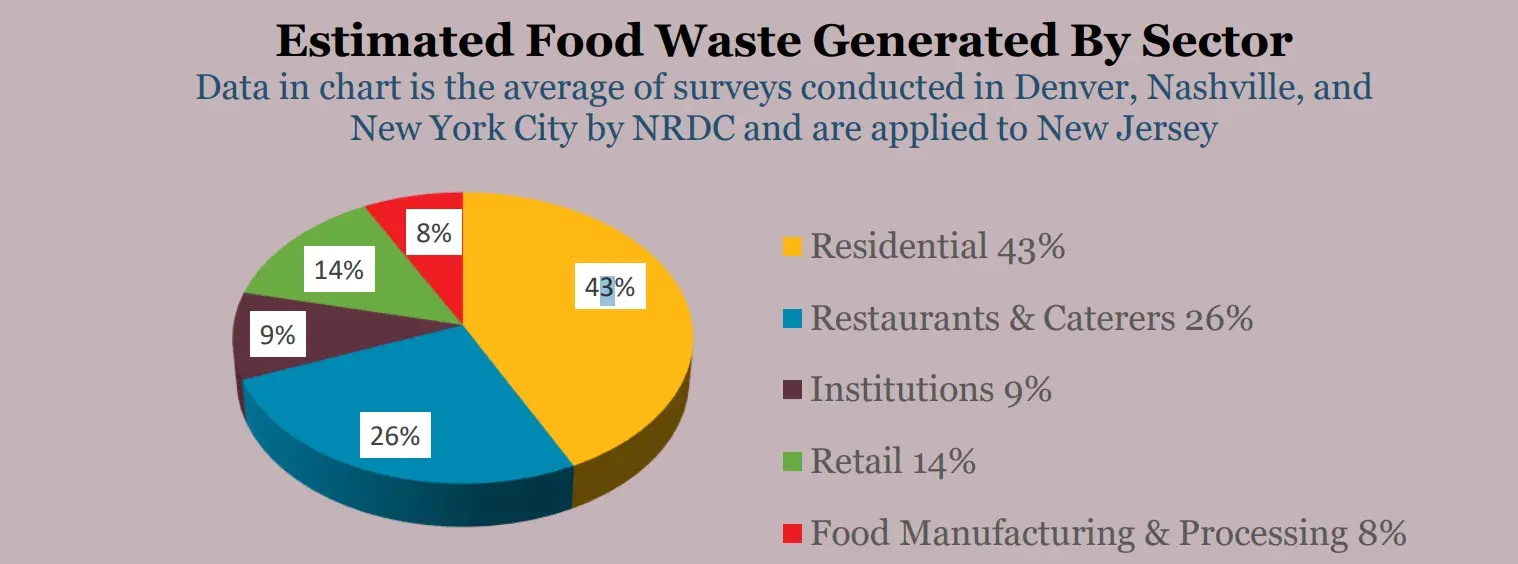
Here’s what you should know:
1. Source Separation of Food Waste
As part of NJAC 7:26K, large food waste generators must source separate food waste from their general waste stream. This is a key part of addressing large food waste in New Jersey, as it’s the first step to ensuring organic materials are recycled instead of ending up in landfills.
To facilitate this process, companies should provide internal bins for waste separation, staff training to enhance awareness, and new company-wide processes to keep food waste streams uncontaminated.
2. Recycling/Disposal Mandate
Separated food waste must be recycled or processed through an authorized method, which includes:
- Sending food waste to an authorized food waste recycling facility that has availability and meets all the requirements at N.J.A.C. 7:26K-2.5. The Linden NJ recycling center is a great solution for companies looking to recycle complex waste streams with full regulatory compliance. Set to become the nation’s largest food waste-to-biogas facility, this program is great for large food waste generators like food distributors, manufacturers, agricultural companies, and more.
- Treating or recycling the waste on-site through enclosed composting, aerobic, or anaerobic digestion.
- Sending the source-separated food waste to a person authorized to accept it for an agricultural purpose.
- Any other method of recycling or reuse of food waste in accordance with New Jersey food laws.
For more details about authorized methods, check out the N.J.A.C. 7:26K regulation.
*While not considered waste, food donations can play an important role in a company’s overall waste management strategy. In addition to giving back to your community, food donations help you prevent waste generation, potentially helping you avoid being classified as a large food waste generator altogether.
3. 25-Mile Rule
Large food waste generators located more than 25 road miles from an authorized food waste recycling facility are exempt from this law. The exemption also applies to companies that are within 25 miles of a facility if that facility lacks capacity or is unable to accept the generator’s food waste.
While some companies are exempt under this rule, they’re still encouraged to enhance food waste management in New Jersey—for example, by partnering with facilities like the Linden recycling center mentioned above.
4. Recordkeeping & Documentation
Companies are required to maintain the following records:
- Calculations to determine large generator status.
- Map showing distance to the nearest authorized food waste recycling facility (within 25 road miles).
- Documentation showing food waste is source-separated and the method used.
- Documentation showing source-separated food waste is being recycled.
- Documentation showing the amount of food waste recycled (tons per calendar year).
- Documentation showing reporting forms were submitted.
- Authorization from the Department to recycle food waste, if applicable.
- Any waiver issued by the Department.
5. Annual Reporting to NJDEP
The annual reporting form must be submitted by April 30th each year and should include information such as whether the generator is subject to source separation and recycling requirements, the amount of food waste generated, a description of the recycling method used, and more.
Failure to submit this form could result in noncompliance and possible penalties from the Department.
6. Bonus: Permits for On-Site Systems
If you’re considering implementing an on-site waste management program, you may require a permit or at least compliance with certain standards under New Jersey food laws. These regulations are designed to protect public health and the environment, so they require careful attention and thoughtful implementation.
Exemptions and Special Provisions
Are you exempt from New Jersey food laws?
Use this image as a guide:
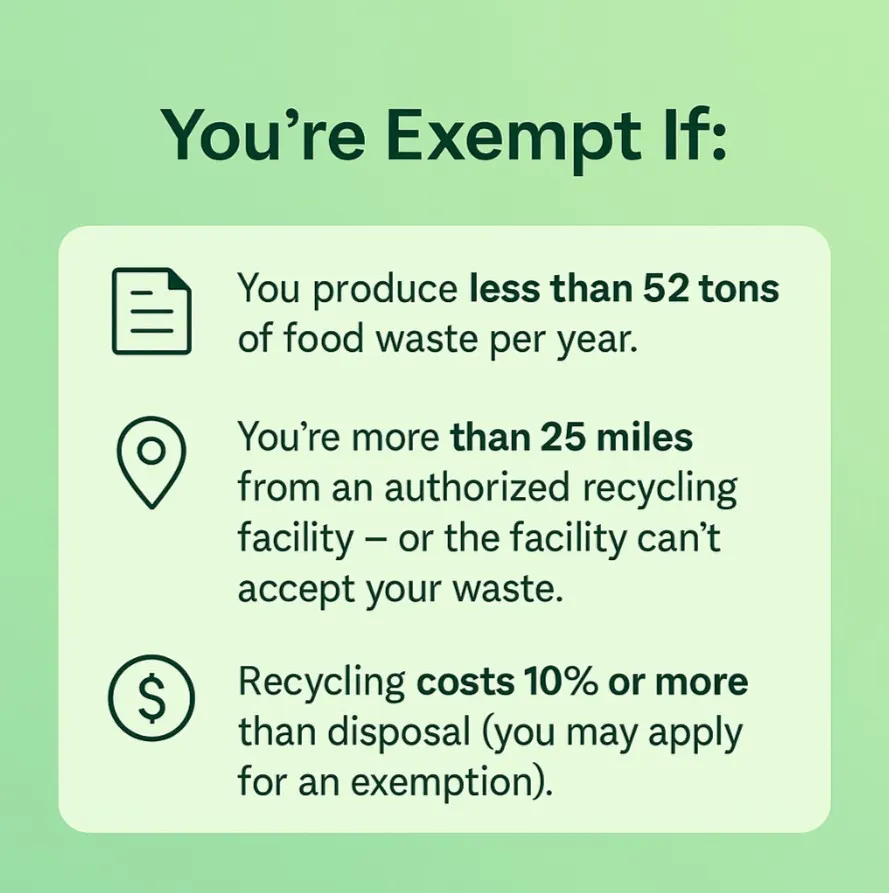
While exemptions exist, compliance is still the goal, as it helps companies avoid noncompliance fees.
As stated by NJAC 7:26K, “Any person that violates any provision of this chapter shall, upon notice from the Department or its authorized representatives, be subject to a civil penalty of $250.00 for the first offense, $500.00 for the second offense, and $1,000 for the third and each subsequent offense.”
With proper NJ food waste management, companies can remain compliant, enhance sustainability efforts, and improve brand image—not a bad deal, right?
Compliance Strategies for Affected Businesses
We understand that managing large food waste in New Jersey while staying compliant is a complex task. Below, we provide tips to help you prepare for new laws.
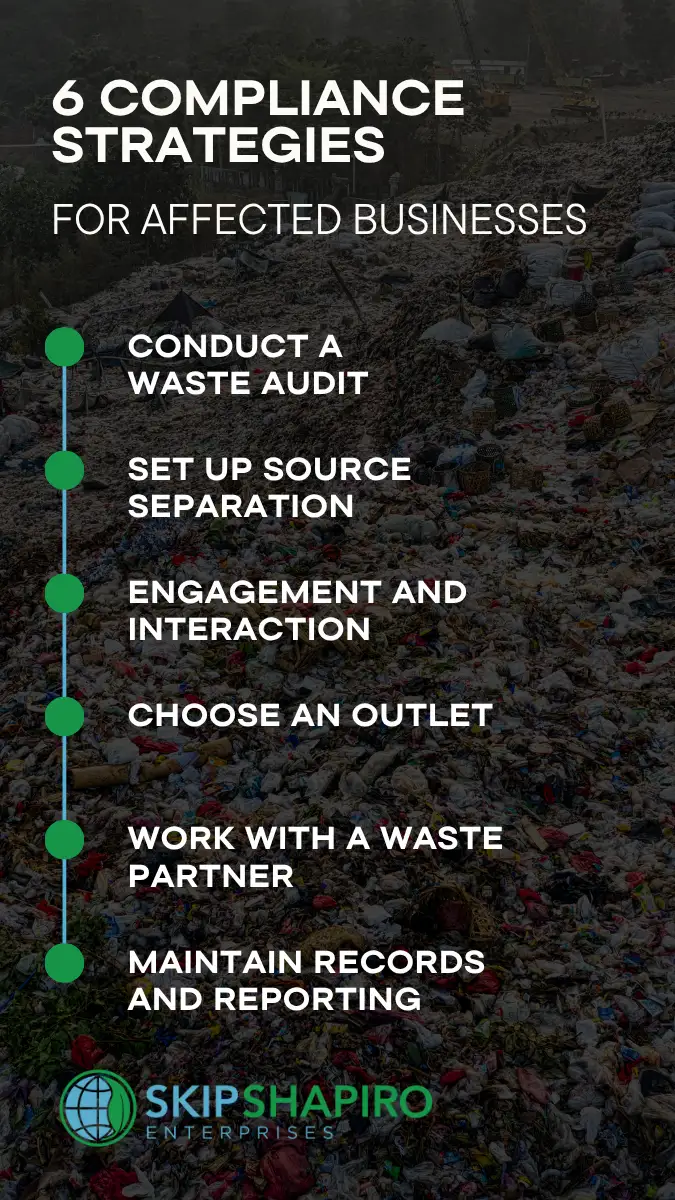
1. Conduct a Waste Audit
Businesses must know how much waste they generate to determine whether they meet the 52-ton threshold. By performing a food waste audit, you not only identify waste sources and quantities, but also implement more effective food waste prevention strategies.
Your company should aim for regular, recurring audits to track changes in waste generation over time and adjust your strategy for greater sustainability.
2. Set Up Source Separation
As mentioned, source separation is the first step to ensuring organic materials are recycled. All things considered, companies must set up their employees for success in this area.
What does that involve?
Installing clearly labeled food waste bins in prep areas and training staff to keep food waste separate from trash. Companies that prepare their staff and emphasize the importance of landfill diversion are better positioned for a successful recycling program.
3. Choose an Outlet
What waste management strategy best fits your company?
Every company must take the time to identify authorized recycling facilities within 25 miles or explore on-site processing options if appropriate.
Facilities like the Linden renewable energy project provide reliable, large-scale outlets for compliance, making it easier for businesses to manage waste responsibly and meet state requirements.
4. Work with a Waste Partner
Food waste management may seem like a confusing process for companies navigating new laws for the first time or wanting to improve their existing strategy. By working with a waste management partner like Shapiro, large food waste generators can get assistance for the collection, transportation, treatment, and recycling of all organic materials—without the stress.
And following the big news of Skip Shapiro Enterprises joining NJFC, our team can also secure space at facilities like the Linden Renewable Energy Project, helping you stay compliant and meet sustainability goals without the hassle of tracking facility availability.
5. Maintain Records and Reporting
Keeping documentation organized simplifies annual reporting and ensures you can demonstrate compliance if requested by regulators.
To keep your records organized, update them after each pickup or recycling activity, include copies of permits and receipts, and review them quarterly to ensure accuracy.
To make this process even easier, you can partner with an experienced waste management company to simplify paperwork, reporting, and audits.
6. Reduce Waste Where Possible
The goal shouldn’t just be to manage waste, but to reduce it wherever possible. By implementing strategies such as improved inventory management, upcycling surplus ingredients, and donating food, your company can reduce overall disposal volumes, costs, and environmental impact.
*Bonus: Food waste tax deductions are provided to eligible companies to encourage donations.
Conclusion
Large food waste generators must stay up to date with New Jersey food waste laws to ensure compliance and improve sustainability. However, complying with NJAC 7:26K isn’t only a legal requirement; it’s also a chance to modernize your company’s operations.
This is because compliance reduces waste disposal fees, supports a circular economy, and appeals to eco-conscious customers and investors by demonstrating green practices.
At Shapiro, we help companies navigate the legal landscape of food waste, making compliance manageable and ultimately beneficial for their business.
If you’re ready to discuss our tailored waste management solutions, contact us today.
FAQs about Food Waste Management in New Jersey
To minimize the effects of food waste, companies can separate it at the source and use solutions like recycling, composting, anaerobic digestion, or donation programs to divert it from landfills.
NJAC 7:26K requires large generators of food waste to source-separate their food scraps and ensure they are recycled or reused rather than sent to landfills. This law applies to New Jersey companies that generate more than 52 tons of food waste annually and are located within 25 miles of an authorized recycling facility.
To comply, large food waste generators must separate food scraps, send them to authorized recycling or reuse facilities within 25 miles, and submit an annual report documenting their recycling activities.
Violations are subject to a civil penalty of $250 for the first offense, $500 for the second, and $1,000 for the third and each subsequent offense.
If your food waste generation occasionally reaches or hovers around the 52-ton threshold, you’re still subject to the regulation during any year you meet or exceed it, so it’s best to track your totals carefully and prepare to comply if you cross the line.
Baily Ramsey, an accomplished marketing specialist, brings a unique blend of anthropological insight and marketing finesse to the digital landscape. Specializing in educational content creation, she creates content for various industries, with a particular interest in environmental initiatives.
